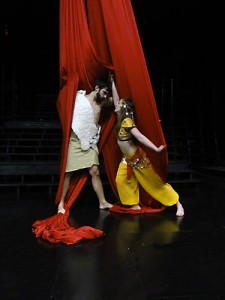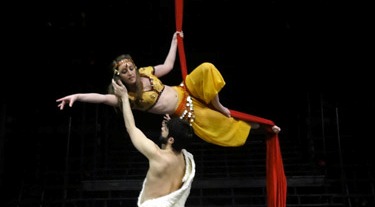
Lizzy Pecora as Salomé and Peter Andrew Danzig as Iokanaan (John the Baptist). (Photo credit: Kimberly Reilly)
When one thinks of Oscar Wilde, witty bon mots skewering Victorian repression immediately come to mind. A serious telling of the death of John the Baptist as revenge by a spurned Salomé does not. Yet, upon further consideration it makes sense. By Wilde’s lifetime, Salomé had become the ultimate icon of a “femme fatale,” a woman who uses her sexuality to tempt and destroy men, and Victorian England had very rigid social mores that Wilde found hypocritical. The majority of his works were written to shed light on this hypocrisy.
The period from 1890 to 1895 was when Wilde reached the zenith of his writing career. Wilde was the toast of London; he also spent part of this period in France, befriending members of the symbolist and decadent movements and writing SALOMÉ—in French (1891). It was during this time that he began his ill-fated love affair with Lord Alfred Douglas, which would soon prove to be his downfall. One can’t help but think that the persecution Wilde faced for his homosexuality engendered an understanding of what drove both Salomé and, for that matter, John.
Head of the Villanova Theatre Department, Rev. David Cregan, directs this new translation by Joseph Donahue. Cregan has paced the story well, eliciting solid performances from the ensemble. Though I have mixed feelings about the addition of Hebrew chants and drumming—maybe that’s just a personal thing…
The moon figures prominently in Wilde’s symbol-filled script, and scenic designer Parris Bradley has placed it prominently on the Vasey stage in a jungle gym-like set that serves the piece well. Jerrold R. Forsyth lights the various levels effectively as the cast climbs and slithers around the space in great costumes by Janus Stefanowicz. Musical direction of the chants was provided by Harold Messinger (the harmonies created are lovely) and the drumming is performed live by Josh Totora.
Following a brief prelude involving members of Herod’s household, SALOMÉ has three episodes in this 90 minute drama. First Salomé (Lizzy Pecora) comes out from a banquet and demands the soldiers bring Iokanaan (as John is called in the play) from his prison. She flirts with the prophet and is rebuffed, with Iokanaan (Peter Andrew Danzig) urging her and her stepfather Herod (Sean Thomas Schmitt-Hall) to repent. You see, Herod has married his brother’s wife, Herodias (Jen Jaynes), who is Salome’s mother. This correlates with the phase of the white moon.
The central—and very public—episode of the play correlates to the red phase of the moon; it deals with Herod’s lust for Salomé. He begs her to dance for him, offering her anything she wants—including half his kingdom. Salomé eventually agrees to dance and performs what has become known as the “Dance of the Seven Veils.” At Villanova they have opted to use aerial silks like those in Cirque du Soleil to create the dance. Pecora trained with Philly’s Give & Take Circus and handles the difficult moves on the silks beautifully—I wished there were more.
The final episode deals with Salome’s request for Iokanaan’s head on a silver platter as her reward. Schmitt-Hall pulls out all the stops as he delivers Herod’s monologue offering Salomé various treasures instead. Salomé insists, Herod relents and Iokanaan is beheaded by the soldiers. Pecora then shows us Salomé’s vulnerability as she delivers a speech to the severed head. We slowly realize that here is a very lonely young girl who just desperately wanted love. She is frightened by the lust she sees in Herod’s eyes but thinks that her sexuality is the only way to get love. She hopes Iokanaan will be different and rejection by the “holy man” hurts most of all.
The entire ensemble does solid work in the piece; in addition to those already mentioned, the production features Victoria Rose Bonito, Brendan Farrell, Lauren Fanslau, John Hala, Brie Knight, Christine Petrini, Ahren Potratz, Emily Poworoznek, Jake Steinberg and Steve Underwood.
SALOMÉ is not often produced; I would recommend taking this opportunity to see a solid production of a rarely seen work.
SALOMÉ
by Oscar Wilde
Translated by Joseph Donahue
Directed by Rev. David Cregan
Villanova Theatre
Vasey Hall
April 9—21, 2013
610-519-7474
www.villanovatheatre.org


